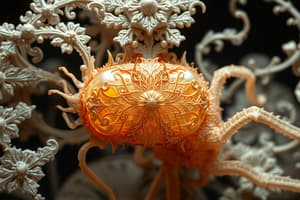Podcast
Questions and Answers
What is the main focus of developmental biology?
What is the main focus of developmental biology?
- The analysis of genetic traits in adults
- The study of embryonic development only
- The effects of environmental factors on adult behavior
- The processes of development throughout the organism's life (correct)
Which process is specifically linked to generating specialized cell types?
Which process is specifically linked to generating specialized cell types?
- Differentiation (correct)
- Growth
- Morphogenesis
- Cell proliferation
What does morphogenesis primarily involve?
What does morphogenesis primarily involve?
- Organizing cells into ordered and predictable structures (correct)
- Random cell division leading to cellular mass
- Proliferation of identical cell types
- Differentiation of cells into stem cells
How is cell division characterized within the growth process of developmental biology?
How is cell division characterized within the growth process of developmental biology?
In the context of developmental biology, what question relates to the formation of ordered structures?
In the context of developmental biology, what question relates to the formation of ordered structures?
What genetic change causes the short legs in dachshunds?
What genetic change causes the short legs in dachshunds?
Which classification system was significantly influenced by the observation of similar larval forms?
Which classification system was significantly influenced by the observation of similar larval forms?
Which of the following statements best describes homologous structures?
Which of the following statements best describes homologous structures?
What primary factor differentiates homologous anatomical structures during evolution?
What primary factor differentiates homologous anatomical structures during evolution?
What caused the longer hair in long-haired dachshunds?
What caused the longer hair in long-haired dachshunds?
What is the main focus of medical embryology?
What is the main focus of medical embryology?
In the bat wing development, what is the role of maintaining a rapid growth rate in the cartilage?
In the bat wing development, what is the role of maintaining a rapid growth rate in the cartilage?
Why were barnacles originally classified as molluscs?
Why were barnacles originally classified as molluscs?
What is the primary function of germ cells?
What is the primary function of germ cells?
What are somatic cells primarily responsible for?
What are somatic cells primarily responsible for?
How does environmental integration influence development?
How does environmental integration influence development?
What role does evolution play in developmental biology?
What role does evolution play in developmental biology?
Which approach studies how anatomical changes in embryos occur during development?
Which approach studies how anatomical changes in embryos occur during development?
What can variations in developmental patterns indicate in evolutionary embryology?
What can variations in developmental patterns indicate in evolutionary embryology?
What do identical twins illustrate in terms of genetic information and development?
What do identical twins illustrate in terms of genetic information and development?
What is teratology concerned with?
What is teratology concerned with?
Flashcards are hidden until you start studying
Study Notes
Evolutionary Embryology
- Accumulation of genetic changes influences embryonic development.
- Dachshund short leg traits result from duplicated Fgf4 gene, which directs cartilage precursor cells.
- Long-haired dachshunds have a mutation in the Fgf5 gene affecting hair production.
Taxonomic Classification through Larval Forms
- Larval forms assist in classifying organisms, revealing evolutionary relationships.
- Barnacles were initially classified as mollusks due to adult morphology.
- J.V. Thompson identified similarities between barnacle larvae and shrimp larvae in the 1830s, correctly classifying barnacles as arthropods.
Embryonic Homologies
- Homologous structures derive from a common ancestor and serve similar functions (e.g., vertebrate forelimbs).
- Analogous structures serve similar functions but do not have a common ancestry (e.g., insect wings vs. bird wings).
Evolutionary Change and Development
- Evolutionary changes emerge from altered developmental processes.
- Bat wings exemplify evolution: rapid cartilage growth of finger digits and inhibition of cell death in webbing between fingers.
Medical Embryology
- Focuses on malformations resulting from genetic mutations and chromosomal defects.
- Addresses developmental biology questions, including differentiation, morphogenesis, growth, reproduction, evolution, and environmental integration.
Definitions
- Embryology: Study of development from fertilization to birth.
- Developmental Biology: Encompasses all developmental processes from fertilization to death.
Key Questions in Developmental Biology
- Differentiation: Investigates how specialized cell types arise from undifferentiated precursors.
- Morphogenesis: Explores how cells organize into specific tissues and structures.
- Growth: Analyzes regulation of cell division and its consequences on structure formation.
- Reproduction: Examines production of new organisms ensuring continuity; germline's role in generating gametes.
- Evolution: Studies how inherited modifications result in new species.
- Environmental Integration: Investigates how non-genetic factors influence development.
Major Cell Lines
- Germ Cells: Produce gametes containing genetic material for next generations.
- Somatic Cells: Comprise the body of the organism excluding germline cells.
Approaches to Developmental Biology
- Anatomical: Comparative embryology assesses anatomical changes across species.
- Experimental: Explores experimental manipulation to understand development.
- Genetic: Investigates genetic influences on development and evolution.
Comparative and Medical Embryology
- Comparative embryology examines anatomical evolution among species.
- Medical embryology focuses on understanding birth defects for insights into normal developmental processes.
Studying That Suits You
Use AI to generate personalized quizzes and flashcards to suit your learning preferences.




